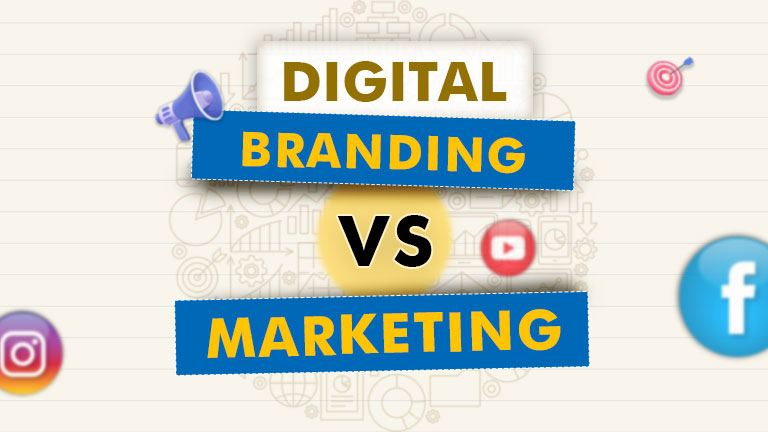Every brand needs a solid digital presence to succeed in today’s fast-paced, technology-driven world. Imagine a brand without an online presence—like a car without tires, bound to go nowhere. Traditional marketing, which once ruled the business landscape, now feels one-dimensional compared to the interactive and dynamic world of digital branding. To stay relevant and accessible, brands must be visible across multiple digital channels, connecting with audiences wherever possible.
In this blog, we’ll break down everything you need to know about digital branding, including its definition and some essential strategies to help establish your brand’s presence in the online world. Let’s dive in!
Table of Contents
What Is Digital Branding?
To understand digital branding, let’s first explore what branding means in general. Branding is the unique identity that distinguishes your brand from competitors. It’s about the qualities, image, and values that make your brand memorable and appealing to customers.
To simplify this further for the online world, digital branding is the process of crafting and promoting the brand’s identity across digital channels like websites, social media platforms, and search engines. The goal is to capture and retain customer attention and build a distinctive online image in the consumer’s mind.
You can narrow down the true meaning of digital branding into the following main components:
- Brand Visibility: A brand that consistently shows up on social media and search engines creates a faster recall factor for the brand. It can be through the brand’s logo, design, or colors. It is essential for recognition. For this, the digital team has to ensure that the brand is visible on channels where the audience is spending their time.
- Identity: This is all about the look and feel of the brand online. Your brand must be instantly recognizable and relatable to the audience, from the logo to the color scheme.
- Credibility: Trust and loyalty are very crucial while building an online presence. For consumers to buy your product and services, your brand must have authority over high-quality products/services, customer service, helpful content, etc. These parameters can lead to customer loyalty and build a strong reputation.
These elements will help the brand resonate with customers and stand out in a competitive digital landscape.
Difference Between Digital Branding vs Digital Marketing

While you understand the definition of digital branding, the term is often interchangeably used for digital marketing. In a business strategy, they serve different functions. Let us comprehend the differences between digital branding vs digital marketing:
- Digital Branding is about building an emotional connection with the audience through storytelling about the brand’s ethos and how the company started. Branding shapes how people perceive the brand over time. Therefore, it focuses on building reputation and long-term customer relationships.
- On the other hand, digital marketing is a series of strategies to promote products and services that encourage consumers to buy the products. Marketing has specific, measurable goals and is campaign-driven, with a common goal to drive conversions and improve traffic on the website.
You can say that digital branding is the foundation that is necessary to create trust and awareness about the brand first and later needs marketing to succeed. To understand further, our social media experts can help you make an impact in the online world.
Benefits Of Digital Branding
Here are some of the following advantages of digital branding:
- Broader Reach and Accessibility: The digital world has no boundaries, so your brand can reach a global audience. Digital branding allows you to engage with people from all over, helping you build a more diverse and inclusive customer base.
- Stronger Customer Loyalty: Digital branding lets you create a unique personality and story for your brand, making connecting with your audience emotionally easier. When customers feel connected to your brand, they’re more likely to stay loyal, leading to repeat business.
- Adaptability and Innovation: The digital world is constantly changing. Brands with a strong digital presence are often quicker to spot trends, respond to feedback, and innovate as needed, helping them stay relevant.
- Valuable Customer Insights: Digital platforms provide real-time data on how customers interact with your brand. This data helps you understand what customers want so you can tailor content, products, and services to meet their needs better.
- Higher Brand Authority: Consistent, positive digital branding builds trust and authority. People who see your brand as reliable and knowledgeable will likely choose it over competitors.
A digital marketeer will help you with their expertise to achieve the benefits and redefine your brand.
Conclusion
By understanding digital branding and how it differs from digital marketing, you can build a strategy that promotes your products and fosters a loyal community around your brand. Embrace digital branding to increase your reach, strengthen your brand’s reputation, and set your business up for success in an online world.
In today’s digital age, branding has evolved. Digital branding is more than just having a website or social media page—it’s about creating a unique online identity that resonates with your audience. From improving visibility to building credibility, digital branding helps businesses connect with customers in lasting ways.
